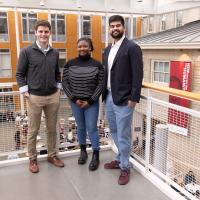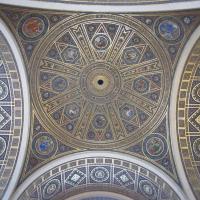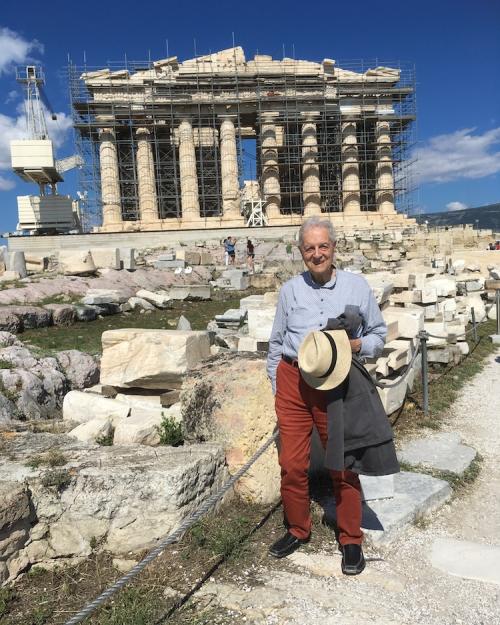Pietro (Piero) Pucci, an influential classical scholar who spent more than 50 years in the Department of Classics in the College of Arts and Sciences (A&S) while maintaining a place among leading intellectuals in Europe, died in Paris on April 7. He was 96.
Remembered as “one of the last of a generation” of classical philologists, Pucci brought fresh insight to ancient texts, according to colleagues and former students, thanks to his openness to interdisciplinary approaches.
“Pietro was the best scholar and colleague one could hope to have, a European of the old school who was generous and kind throughout his life,” said President Emeritus Hunter R. Rawlings III, professor emeritus of classics (A&S). “Always the inquiring philologist, he published articles and books on a wide range of subjects, and he helped younger faculty members. We miss his ready laugh, his sense of what a professor should be and his steady presence in the department. Classicists all over the world regret his passing, so broad and deep was his reach.”
With his scholarly and cultural interests extending beyond ancient literature, Pucci moved in social and intellectual circles with Jacques Derrida and Michael Foucault, according to Frederick Ahl, professor of classics and Stephen H. Weiss Presidential Fellow (A&S), and he counted Luciano Pavarotti among his friends. Pucci hosted the legendary tenor for a visit to Ithaca, including a recital in Bailey Hall in February 1977.
“Perhaps, like the Roman poet Ennius, Piero had not just one but three hearts, the product of his three ‘modern’ languages and cultures,” Ahl said. “In Piero’s case, one heart was Italian, one French and one American.”
“Pucci was an energetic and adventurous scholar on ancient Greek poetry and thought, producing a steady stream of books in three languages,” said Jeffrey Rusten, professor emeritus of classics (A&S). “They combined the philological rigor of his youthful training with adventurous new approaches to literature.”
In 1989 Pucci established a graduate student-faculty conference at Cornell on Greek poetry with colleagues at Harvard University and the University of Lille. CorHaLi, as it is known, has grown to include six schools on both sides of the Atlantic and “continues to this day to be a sterling force of original research and creative insight,” said Philip Lewis, professor emeritus of Romance studies and former dean of A&S. The 25th conference was held in Ithaca, in summer 2023.
Also the inaugurator of a lecture series featuring distinguished classicists, Pucci generated intellectual excitement through his teaching, said Cynthia Chase, professor emerita of literatures in English (A&S). “Pietro Pucci was both an erudite, old-fashioned scholar and a brilliant and original practitioner of literary theory, of reading against the grain.”
Many of Pucci’s students are now professors of classics at universities in the U.S. and Europe, said Christos Tsagalis, Ph.D. ’98, professor of philology at Aristotle University in Thessaloniki, Greece.
“By his example, his deep knowledge of antiquity, his love of Greece, his balanced and deeply philosophical view of the world and his wonderful Italian temperament, he continued to teach his students to the end,” Tsagalis said. “His students lose a wonderful teacher and friend, and classical philology loses one of the last great philologists of a generation that combined wisdom with generosity and an aristocratic view of intellectual life with a democratic and equal treatment of others.”
“Pietro Pucci’s life as an academic was exemplary until the very end,” said Laurent Dubreuil, professor of French, Francophone and comparative literature (A&S). “He always remained fully dedicated to the task of renewing meaning through the task of interpretation, while keeping a benevolent interest in the newer generations of thinkers, artists, colleagues and students.”
Pietro Pucci was born in Modena, Italy in November 1927. He learned ancient Greek and Latin at the Liceo Classico Muratori in Modena. He studied classical literature at the Scuola Normale Superiore in Pisa and then in Florence with the well-known Hellenist Giorgio Pasquali. He began his academic career at the University of Florence in the early 1950s.
After Pasquali’s death, Pucci moved to North America, teaching at the University of Ottawa from 1952 to 1961 and at the University of Kansas from 1961 to 1962.
In 1962, he started teaching at Cornell, where he was a member of the Department of Classics faculty until his 2015 retirement. He then remained active as the Goldwin Smith Professor of Classics Emeritus.
Pucci’s research contributions to classical philology (study of the structure and history of ancient languages) include detailed commentary and annotation of texts, ancient Greek metrics, textual criticism and hermeneutical analysis. “Pucci embarked on a systematic effort to illuminate the underlying components of ancient Greek literature,” Tsagalis said.
Pucci published books and articles on Homer, Hesiod, Sophocles, Euripides, Plato and Xenophon. He remained an active scholar post-retirement, publishing his last monograph, “The Iliad – the Poem of Zeus,” in 2018 and a co-authoring a book in French, “La Parole au Miroir,” in 2022.
His contribution to classical literature was widely recognized by honors that include visiting professorships at the Universities of California, the University of Florence and Princeton University. He was a fellow of the Center for Hellenic Studies, the John Simon Guggenheim Memorial Foundation, the National Endowment for the Humanities and the American Academy in Rome.
A celebration of Pucci’s life was held in Paris on April 11. Cornell colleagues were among those to give homages.
Pucci is survived by his wife, Jeannine Routier-Pucci, retired senior lecturer in Romance Studies; two children from his first marriage and four grandchildren.




